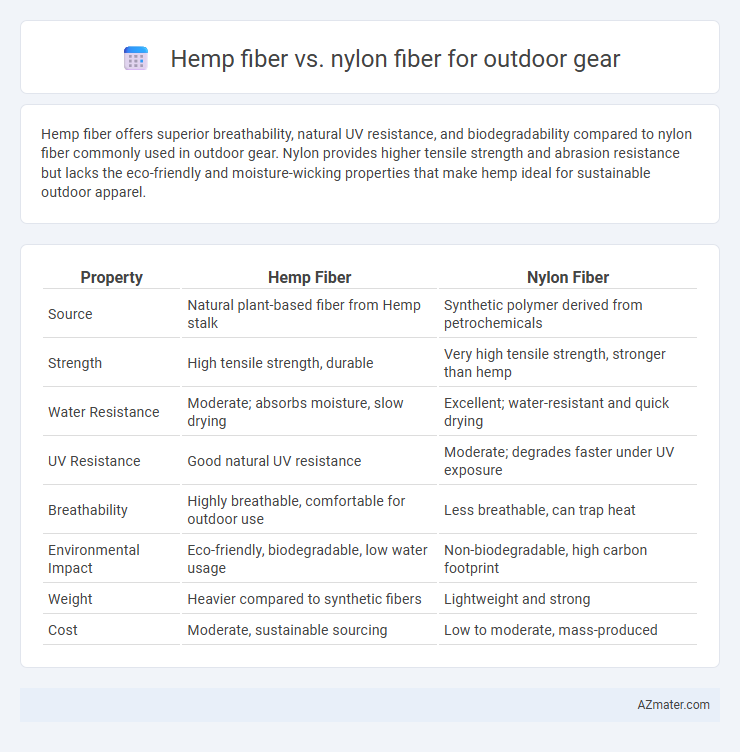Hemp fiber offers superior breathability, natural UV resistance, and biodegradability compared to nylon fiber commonly used in outdoor gear. Nylon provides higher tensile strength and abrasion resistance but lacks the eco-friendly and moisture-wicking properties that make hemp ideal for sustainable outdoor apparel.
Table of Comparison
| Property | Hemp Fiber | Nylon Fiber |
|---|---|---|
| Source | Natural plant-based fiber from Hemp stalk | Synthetic polymer derived from petrochemicals |
| Strength | High tensile strength, durable | Very high tensile strength, stronger than hemp |
| Water Resistance | Moderate; absorbs moisture, slow drying | Excellent; water-resistant and quick drying |
| UV Resistance | Good natural UV resistance | Moderate; degrades faster under UV exposure |
| Breathability | Highly breathable, comfortable for outdoor use | Less breathable, can trap heat |
| Environmental Impact | Eco-friendly, biodegradable, low water usage | Non-biodegradable, high carbon footprint |
| Weight | Heavier compared to synthetic fibers | Lightweight and strong |
| Cost | Moderate, sustainable sourcing | Low to moderate, mass-produced |
Introduction: Comparing Hemp and Nylon Fibers for Outdoor Gear
Hemp fiber offers exceptional durability, breathability, and natural resistance to UV rays and mold, making it a sustainable choice for outdoor gear. Nylon fiber excels in high tensile strength, abrasion resistance, and quick-drying capabilities, providing superior performance in extreme weather conditions. Comparing hemp and nylon highlights the trade-offs between eco-friendly materials and synthetic fibers optimized for technical durability.
Material Origins: Natural vs Synthetic
Hemp fiber, derived from the stalks of the Cannabis sativa plant, offers a renewable and biodegradable option for outdoor gear, emphasizing sustainability and environmental friendliness. Nylon fiber, a synthetic polymer created from petrochemicals, provides superior elasticity, durability, and water resistance, making it a strong candidate for demanding outdoor applications. The choice between hemp and nylon fibers hinges on balancing natural material benefits against the high-performance characteristics of synthetic fibers.
Strength and Durability Analysis
Hemp fiber offers remarkable tensile strength and natural resistance to abrasion, making it highly durable for outdoor gear exposed to rough conditions. Nylon fiber provides superior elasticity and exceptional resistance to wear, maintaining durability even under repetitive stress and moisture exposure. Comparing strength-to-weight ratios, nylon often delivers higher performance in lightweight applications, while hemp excels in environmentally sustainable, long-lasting gear options.
Environmental Impact and Sustainability
Hemp fiber boasts superior environmental benefits compared to nylon fiber for outdoor gear due to its biodegradability, low water usage, and minimal pesticide requirements during cultivation. Nylon fiber is petroleum-based, contributing to greenhouse gas emissions and microplastic pollution, which negatively impacts ecosystems. Choosing hemp fiber reduces carbon footprint and promotes sustainable practices in the production of outdoor gear.
Moisture Management and Breathability
Hemp fiber offers superior moisture-wicking properties due to its natural hygroscopic structure, allowing it to absorb and release moisture efficiently, which keeps outdoor gear dry and comfortable. Nylon fiber, while durable and quick-drying, tends to trap sweat and moisture close to the skin, reducing overall breathability and causing discomfort during extended physical activity. The inherent breathability of hemp fiber also supports better air circulation compared to the synthetic nature of nylon, making it a preferred choice for moisture management in outdoor apparel.
Weight and Packability Considerations
Hemp fiber is naturally lightweight and more breathable than nylon, making it ideal for outdoor gear that requires comfort and moisture-wicking properties. Nylon fiber, while heavier than hemp, offers superior durability and abrasion resistance, important for rugged environments but potentially increasing pack weight. Selecting hemp fiber enhances packability due to its compressibility and lower weight, whereas nylon provides better resilience at the cost of slightly increased bulk and weight.
Comfort and Wearability Outdoors
Hemp fiber offers superior breathability and moisture-wicking properties, making it ideal for outdoor gear that requires comfort in varying weather conditions. Nylon fiber provides excellent strength and abrasion resistance but tends to trap heat and moisture, reducing comfort during extended wear. Combining hemp's natural softness with nylon's durability often results in outdoor gear with enhanced wearability and temperature regulation.
Resistance to Weather and UV Exposure
Hemp fiber offers superior resistance to UV exposure compared to nylon fiber, as its natural lignin content provides inherent UV protection, reducing degradation over time. Nylon fiber tends to weaken and lose tensile strength when exposed to prolonged sunlight and harsh weather conditions, making it less durable for outdoor gear. The breathability and moisture-wicking properties of hemp also enhance its performance in varied weather, while nylon often retains moisture, potentially leading to mildew in outdoor environments.
Maintenance, Care, and Longevity
Hemp fiber offers superior breathability and natural antimicrobial properties, reducing odor buildup and requiring less frequent washing compared to nylon fiber. Nylon fibers are highly durable and resistant to abrasion but tend to degrade faster when exposed to UV rays and frequent washing, potentially shortening the lifespan of outdoor gear. Proper maintenance of hemp gear involves gentle cleaning and air drying to preserve fiber strength, while nylon gear benefits from machine washing with mild detergents and avoiding excessive heat to maintain elasticity and durability.
Cost-Effectiveness and Market Trends
Hemp fiber offers superior cost-effectiveness for outdoor gear due to its renewable nature, biodegradability, and growing agricultural scale that reduces production costs compared to synthetic nylon fiber. Market trends show increasing consumer demand for sustainable materials, boosting hemp's popularity despite nylon's traditionally lower price and higher durability in abrasion resistance. Investments in hemp processing technologies and textile innovations are accelerating its adoption, positioning hemp fiber as a competitive alternative to nylon in the eco-conscious outdoor gear market.

Infographic: Hemp fiber vs Nylon fiber for Outdoor gear
 azmater.com
azmater.com